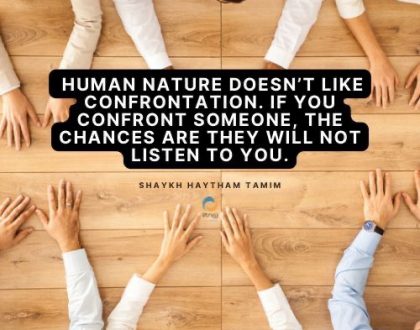A letter to my friend. Part 1: The 7 traits of the successful believer

by Abu Shama
Imam Al-Muhasibi wrote a letter to his friend [as usual, it’s framed as on the account of a wise man who wrote to his friend] offering some advice. We have mentioned before that Imam Al-Muhasibbi’s close companion is Al-Junayd Al-Baghdadi. He wrote: “I advise you to…
1. Eethar: Give preference to Allah first
Fix what is between you and Allah, in other words, fix your relationship with Allah. Do you know what it means to fix your relationship with Allah?
- It means you shouldn’t do anything that displeases Allah.
- Put what Allah loves over what you love. Give preference to what Allah wants over what you, your whims and desires want.
2. Iqbal: Come forward to Allah wholeheartedly
Do an abundance of good deeds
Do an abundance of good deeds (wholeheartedly) in order to gain closeness with Allah for you need Allah and Allah does not need you.
- Iqbal comes from the root word [قَبِلَ] which means to accept. Aqbala (lit. it’s the verb that means to come forward, come closer). And Iqbal is the person who comes forward.
Your days are limited
- Your days are limited and you have only one life and one soul.
- There are things in life which have substitutes, as for time, there is no substitute.
- If your day is wasted, then a part of your life is wasted,
- As the acronym ‘YOLO’ suggests ‘You Only Live Once’ – so do what will please Allah.
You need Allah and Allah does not need you
We need Allah and He does not need us. Allah is free of all wants and need. He is Al-Hayy (All-Living) and Al-Qayyum (self-Sufficient). He created the creation of the Heavens and the Earth and everything that dwells within them. They all need Allah and is dependent upon Him. Every moment, Allah is sustaining everything.
We have two types of need from Allah. (1) Existential need and (2) salvific need.
As for existential need, it is that He created you from non-being to being, and He sustains your existence through sustenance, moment-by-moment. Ata’illah has captured this in his Hikam:
“There are two blessings [ni‘matan] from which no being can be separated and that are inevitable for every creature: the blessing of existence [al-ijad], and the blessing of sustenance [imdad].” [Hikam 97]
“He bestowed His blessings upon you, first, through giving you being [bi’l-ijad], and, second, through uninterrupted sustenance [imdad].” [Hikam 98]
As for salvific need, it is that you need Magfirah (forgiveness) and Affu (pardon). The Messenger of Allah (ﷺ) said:
“All of the Children of Adam constantly err, the best of those who constantly err are those who repent.” [Tirmidhi]
We are weak and we constantly make mistakes, we have shortcomings in everything we do and say, and we routinely fall into sin(s). We need Allah to forgive and pardon us. We need to always ask Allah for forgiveness and His mercy. If we attain His forgiveness and pardon, we gain salvation and the blessed life of Paradise in the Hereafter.
But of our inherent nature of forgetfulness and ingratitude, we keep forgetting our state of need before Allah.
“Indeed, man transgresses all bounds, in thinking himself to be self-sufficient, and to your Lord is the return.” [Al-Alaq: 96:6-8]
Man thinks he is self-sufficient, he acts with arrogance and pride of what he has achieved – to the extent that he thinks he is god! And then Allah sent a tiny virus which defeated the technological, military, financial, economic and scientific infrastructure that he relied upon. It shows us we are a creature of need, we are weak, we are still ignorant and are powerless against Allah.
The creation of Paradise and Hell
Remember, Allah has created Adam and his progeny for Paradise or for Hell. He created Paradise as a reward for those who obey Him. They shall have His Rida (pleasure). He created Hellfire as punishment for those who disobey Him. They have His Ghadab (anger).
The Messenger of Allah (ﷺ) said:
“Do good deeds properly, sincerely and moderately, and receive good news because one’s good deeds will not make him enter Paradise.” They asked, “Even you, O Messenger of Allah (ﷺ)?” He said, “Even I, unless and until Allah bestows His pardon and Mercy on me.” [Bukhari]
So do your bit (by performing good deeds) to make you closer to Allah and draw His Mercy and then you seek what you need from Him, which is His forgiveness and pardon. Without Mercy and Forgiveness there is no salvation in the Hereafter. We seek refuge from Allah from His anger and punishment. We seek His mercy and pleasure.
3. Rida: Accept destiny
Anything you receive in your life from Allah, take it with Rida (contentment and satisfaction) whether it is seeming to be ‘good’ or ‘bad’.
Remember, Rida is a station.
A station of internal acceptance and satisfaction in what Allah has sent. This is a reflection of acceptance of one of the six tenets of faith, [to believe in Qadr, destiny – the good of it and the bad of it]. Rida is a reflection of acceptance of Qadr, choosing to trust the wisdom of Allah, the All-Wise, believing wholeheartedly that Allah is looking after the best interest of His servants. And know that Allah is pleased with His servants as long as he is pleased with His destiny.
4. Sabr: Have patience
If you cannot accept Qadr with Rida, then you should endure it with Sabr (patience).
You should not show your dissatisfaction with regards to the destiny by complaining to the creation about what the Creator has sent to you. There are only two choices; you take the destiny with Rida or you take it with Sabr.
5. Amal: Do good actions
You should do the deeds that make you closer to Allah, as the Imam said, ‘you need Allah and He doesn’t need you.’
6. Wafa: Fulfill your covenant with Him
The deed that you have to do is the fulfilling of the covenant that you have taken with Allah,
‘And [mention] when your Lord took from the children of Adam – from their loins – their descendants and made them testify of themselves, [saying to them], “Am I not your Lord?” They said, “Yes, we have testified.”’ [Al-Araf: 7:172]
The fulfilment of this covenant is to remain loyal to Allah, to worship Him alone and not to make partners with Him with anything. So everything you do and say, should be a testament in fulfilling your covenant with Allah.
7. Shukr: Have gratitude
Be grateful to the favours of Allah. This is not only good manners, but it also secures and thereafter increases the favours. Incidentally, both of these are from Surah Al-Fatiha,
“All praise is [due] to Allah, Lord of the worlds.” [Al-Fatiha:1:1]
Delivered by Shaykh Haytham Tamim on 20th June 2020. Transcribed by Abu Shama
Based on Adab an Nufus (The Etiquette of the Souls) by Imam al Harith Muhasibi, (781–857) who was the founder of the Baghdad School of Islamic philosophy, including the Sufi masters Junayd al Baghdadi and influenced many subsequent theologians, such as al Ghazali. It is a simple guide to spirituality from the third century scholar whose nickname Mushasibi (the one takes account) specialised in introspection, and moral and spiritual development.
Recommended Posts

Can playing with children be an act of worship?
February 21, 2023

What is nasiha – How to be sincere and give advice
December 20, 2022

Whomsoever Allah wishes good for…
February 08, 2022


